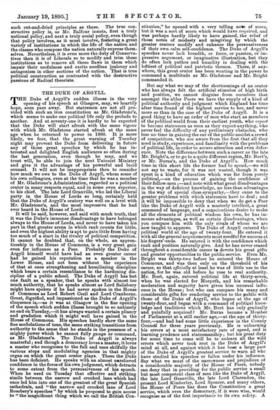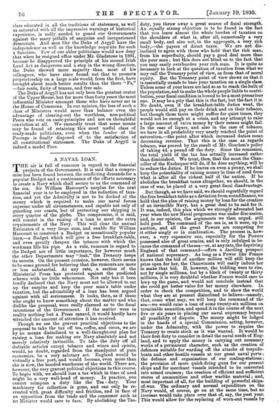THE DUKE OF ARGYLL. T HE Duke of Argyll's sudden illness
in the very opening of his speech at Glasgow, may, we heartily hope, soon pass away. But statesmen are not all pro- vided with such an iron constitution as Mr. Gladstone's, which seems to make one political life only the prelude to another. And at seventy-one it is hardly to be expected that the Duke will start afresh with the same vigour with which Mr. Gladstone started afresh at the same age when he returned to power in 1880. It is more likely, we fear, that the great warning of Tuesday night may prevent the Duke from delivering in future any of those great speeches by which he has in- terested and delighted English audiences so often during the last generation, even though he may, and we trust will, be able to join the next Unionist Ministry and give it the advantage of his powerful and lucid counsel. It will not be inappropriate then to consider how much we owe to the Duke of Argyll, whom some of his own colleagues, even at the time that he was a member of Mr. Gladstone's Administration, regarded as a political orator in many respects equal, and in some even superior, to his chief. The late Lord Granville, who led the Liberal party in the House of Lords so long, certainly held that the Duke of Argyll's oratory was well on a level with Mr. Gladstone's, and the most impressive that he had ever heard in the House of Lords.
It will be said, however, and said with much truth, that it was the Duke's immense disadvantage to have belonged always to the House of Lords, and never to have taken his part in that greater arena in which rank counts for little, and even the highest ability is apt to gain little from having too much of a start in the rivalry of political competition. It cannot be doubted that, on the whole, an appren- ticeship in the House of Commons, is a very great gain even for influence as a Peer. Probably the Duke of Argyll himself would have had an even greater career had he gained his reputation as a speaker in the Lower House, and not been without the experience of that at once strengthening and humiliating discipline which bears a certain resemblance to the hardening dis- cipline of a public school. The Duke of Argyll has but one fault as a speaker, that he speaks with almost too much authority, that he speaks almost as Lord Salisbury might have spoken if he had never spoken in the House of Commons as Lord Robert Cecil and Lord Cranborne. Great, dignified, and impassioned as the Duke of Argyll's eloquence is,—as it was at Glasgow in the fine opening of the speech which sudden illness brought to so untimely an end on Tuesday,—it has always wanted a certain pliancy and gradation which it might well have gained in the House of Commons. His speeches hardly show the same fine modulations of tone, the same striking transitions from authority to the sense that he stands in the presence of a mighty power which he cannot fully gauge or command, as Mr. Gladstone's. The Duke of Argyll is always masterful ; and though a democracy loves a master, it loves a master who recognises to the full and uses skilfully the various stops and modulating agencies in that mighty organ on which the great orator plays. There the Duke has been deficient. He speaks with an almost unrelieved confidence in the force of his own judgment, which detracts to some extent from the persuasiveness of his speech. When he used on Tuesday that effective and striking simile between the narrow and crooked lane which had once led him into one of the greatest of the great Spanish cathedrals, and "the narrow and crooked lane of Lord Rosebery's speeches" by which he proposed to gain access to "the magnificent thing which we call the British Con- stitution," he opened with a very telling no of scorn, but it was a sort of scorn which would have required, and was perhaps hardly likely to have gained, the relief of those notes of modesty and misgiving by which the greater orators modify and enhance the persuasiveness of their own calm self-confidence. The Duke of Argyll's speeches never lack breadth, or force, or passion, or im- pressive argument, or imaginative illustration, but they do often lack pathos and humility in dealing with the loftiest of political and patriotic themes. There, if any- where, this great orator has been wanting in the power to command a multitude as Mr. Gladstone and Mr. Bright commanded it.
But say what we may of the shortcomings of an orator who has always felt the artificial stimulus of high birth and position, we cannot disguise from ourselves that amongst the abler Peers we have the supply of a kind of political authority and judgment which England has time after time found of the highest service to her, and never more so than in the case of the Duke of Argyll. It is a good thing to have an order of men who start as members of the political world from their earliest youth, who expect to become statesmen as soon as they expect anything, who never feel the difficulty of any preliminary obstacles, who lose no time in gaining the ear of the public amidst a crowd of competitors, who are aware from the first that all they need is study, experience, and familiarity with the problems of political life, in order to secure attention and even defer- ence. Note the difference between such a career as the late Mr. Bright's, or to go to a quite different region, Mr. Burt's, or Mr. Burns's, and the Duke of Argyll's. How much time in this short life the former had to spend,—we will not say to waste, for it was not wasted, though it was spent in a kind of education which was far from purely political,—on the process of gaining the confidence of their fellow-men ;—and note with what great disadvantages in the way of deficient knowledge, no less than advantages in the way of special class-sympathy,----they came to the greater problems with which statesmen have to deal ; and it will be impossible to deny that when we do get a Peer like the Duke of Argyll with a masterly intellect, a great command of language, and a conscientious desire to make all the elements of political wisdom his own, he has im- mense advantages, as well as certain disadvantages, when you compare him with the only rivals of whom we are now, taught to approve. The Duke of Argyll entered the political world at the age of twenty-four. He entered it with all the general acquirements most needful for success at his fingers'-ends. He entered it with the confidence which rank and position naturally give. And he has never ceased throughout a considerable career to devote his great gifts and greater opportunities to the public service. Even Mr. Bright was thirty-two before he entered the House of Commons, and was then only on the threshold of his career, so that officially at least he was of little use to the nation, for he was old before he rose to real authority. Mr. Burt, again, entered political life at thirty-seven, when he was elected for Morpeth, and his remarkable moderation and sagacity have given him unusual influ- ence in the House; but who can compare his many and considerable gifts for rendering service to the public with those of the Duke of Argyll, who began at the age of twenty-four, and began with a command of political know- ledge and traditions which Mr. Burt has only gradually and painfully acquired ? Mr. Burns became a Member of Parliament at a still earlier age,—at the age of thirty- four,—and had had some little experience in the County Council for three years previously. He is unlearning his errors at a most satisfactory rate of speed, and is learning prudence and statesmanship ; but his great duty for some time to come will be to unlearn all the wild errors which never took root in the Duke of Argyll's mind at all, and against which it has been a large part of the Duke of Argyll's greatest service to warn all who have studied his speeches or fallen under his .influence. Say what we must of the narrowness and prejudices of a considerable majority of the House of Peers, nobody can deny that in providing for the public service a small but most competent class of men like the Duke of Argyll, the late Lord Granville, the late Lord Clarendon, the present Lord Kimberley, Lord Spencer, and many others, the House of Peers has done the Constitution a great service, which even the democracy, if it were wise, would recognise as of the first importance to its own safety. A class educated in all the traditions of statesmen, as well as saturated with all the impressive warnings of historical experience, is sadly needed to guard our Governments against the many pitfalls of sanguine and inexperienced democrats. And men like the Duke of Argyll have the independence as well as the knowledge requisite for such a function. Few of our abler politicians would now deny that when he resigned office under Mr. Gladstone in 1881, because he disapproved the principle of his second Irish Land Act as dangerous and a step in the wrong direction, the Duke showed more sagacity than most of his colleagues, who have since found out that to promote proprietorship on a large scale would, from the first, have brought about much better results than the three "Fs," —fair rents, fixity of tenure, and free sale.
The Duke of Argyll has not only been the greatest orator of the Upper House, but for more than forty years the most influential Minister amongst those who have never sat in the House of Commons. In our opinion, the loss of such a class of Ministers would more than balance even the advantage of clearing-out the worthless, non-political Peers who vote on caste-principles and not on thoughtful conviction at all. We earnestly trust that some means may be found of retaining this most useful class of ready-made politicians, even when the lumber of the Peerage is finally disposed of to the satisfaction of all constitutional statesmen. The Duke of Argyll is indeed a model Peer.



































 Previous page
Previous page